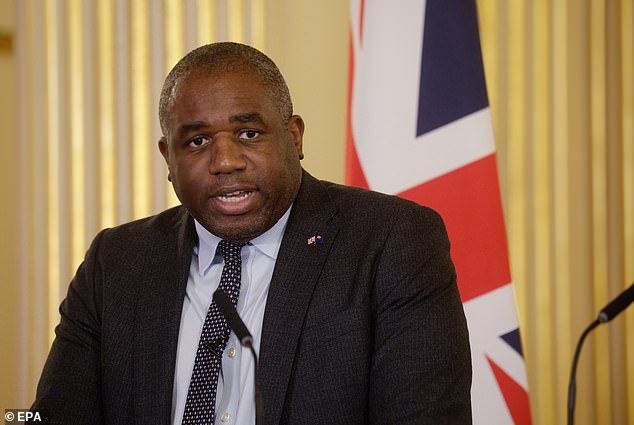Britain sends delegation of senior diplomats to Syria for talks with the rebels who brought down Bashar al-Assad’s regime



Britain has sent a delegation of senior diplomats to Syria for talks with the rebels who brought down Bashar al-Assad’s regime, David Lammy said last night.
The Foreign Secretary said the team will tell leaders of the paramilitary group Hayat Tahrir al-Sham (HTS) that the UK wants to see chemical weapons stockpiles secured.
They will also urge them to allow for an ‘inclusive transitional political process that is Syrian-led and Syrian-owned’, he added.
HTS spearheaded the overthrowing of the Syrian president this month and there was confusion about whether Britain can and should have meaningful contact with it while it remains a banned terrorist organisation.
It was once an affiliate of Al Qaeda but the group’s insurgent leaders claim it has broken with its extremist past. However, it remains banned in the UK and ministers have not said if they will lift this.
On Sunday night, Mr Lammy said that ‘diplomatic contact’ had been had with HTS.
But speaking yesterday at a press conference in Westminster after meeting his Australian counterpart, he said he had not engaged with HTS directly but that a team had been dispatched to assist with the transition.
He said: ‘I can confirm today that we have sent a delegation of senior UK officials to Damascus this week for meetings with the new interim Syrian authorities and members of civil society groups in Syria. And it underlines our commitment to Syria.’

Foreign Secretary David Lammy has confirmed that a delegation of senior diplomats have been sent to Syria for talks with rebel forces

UN Special Envoy for Syria Geir O Petersen meets HTS leader Abu Mohammad al-Jolani in Damascus

People celebrate the collapse of 61 years of Baath Party rule in Umayyad Square after armed groups, opposing the Assad regime, take control in Damascus

Workers carry human remains from a newly uncovered mass grave in a field in Izra, in Syria’s southern Daraa province
He said that the team would help to push for ‘secure chemical weapons stockpiles in Syria’, adding: ‘An inclusive transitional political process that is Syrian led and Syrian-owned.’
Meanwhile, Assad last night claimed he only fled Syria at ‘the very last moment’ after standing alongside his soldiers on the battlefield.
In his first public statement since rebel fighters ousted him, Assad said he had been ‘on the front lines, just metres from terrorists in the most dangerous and intense battlefields’ when Moscow ordered him to leave.
The tyrant, who tortured, gassed and executed political opponents during a brutal 24-year reign, lamented that Syria has ‘fallen into the hands of terrorism’.
On the encrypted messaging service Telegram, Assad wrote that his departure from Syria was ‘neither planned nor did it occur during the final hours of the battles, as some have claimed’. He said that when HTS rebels infiltrated Damascus on December 8, he moved to a Russian air base in Latakia.
He added: ‘As the field situation… continued to deteriorate, the Russian military base itself came under intensified attack by drone strikes.
‘With no viable means of leaving the base, Moscow requested that the base’s command arrange an immediate evacuation to Russia.’ He claimed he left the country later that night, long after Damascus had fallen.
However, former officials have said he escaped in secret hours earlier. Assad said he ‘never sought positions for personal gain’, but accepted that it would be ‘meaningless’ to continue as leader.

Syrian Air Force helicopters left destroyed by Israeli air strikes at Mezzeh Military Airport near Damascus

A damaged portrait of ousted president Bashar al-Assad lying on the ground in the city of Latakia

Russian president Vladimir Putin attends a meeting with Syria’s Bashar al-Assad at the Kremlin in July
Meanwhile, Israel continued to target the former regime’s military assets.
Last night, Syria’s new leader Abu Mohammed al-Jolani told The Times: ‘We are committed to the 1974 [armistice] agreement. We do not want any conflict… and we will not let Syria be used as a launchpad for attacks. The Syrian people need a break, and the strikes must end.’
The UK-based Syrian Observatory for Human Rights said Israel’s attacks on Sunday were ‘the most violent’ raids in the country’s coastal region in more than a decade, targeting 18 sites near the city of Tartus.
Last night, the US military said it had killed 12 Islamic State terrorists in Syrian airstrikes, too.
General Michael Erik Kurilla said: ‘We will not allow Isis to take advantage of the situation.’

